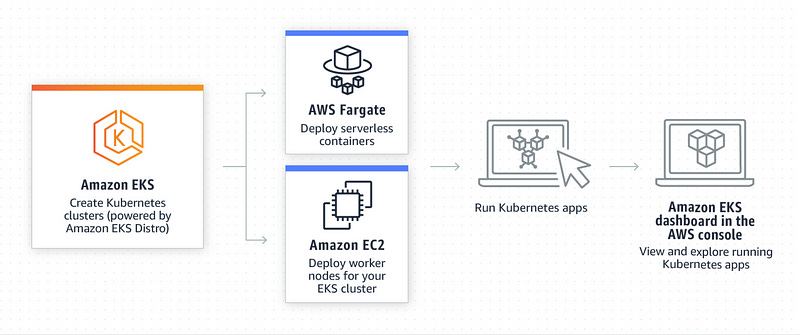Some considerations for selecting cloud container solutions
Both Amazon EKS (Elastic Kubernetes Service) and Amazon ECS (Elastic Container Service) are container orchestration services offered by AWS, but they cater to different needs and preferences. Here are some considerations to help you decide which is right for your workload:
Complexity:
- EKS: Kubernetes comes with a steeper learning curve and might be overkill for simple deployments. This can be hard to find experienced K8s skills to bring into your organization. The degree of difficulty and specialized skills here is much higher than that of ECS.
- ECS: It’s more straightforward for basic container deployments.
Familiarity with Tools:
- EKS: If your team is already familiar with Kubernetes or if you are planning to use Kubernetes’ capabilities extensively, go with EKS. Kubernetes is a popular open-source container orchestration tool, and its skills and tools are transferable across cloud providers.
- ECS: If you are deeply integrated with other AWS services and prefer a more native AWS experience without the overhead of managing Kubernetes, ECS might be a better choice.
Portability:
- EKS: Kubernetes is cloud-agnostic. If you think there’s a possibility of moving your workloads across different cloud providers in the future, EKS can provide better portability.
- ECS: It’s more AWS-centric, making it slightly less portable than other cloud platforms.
Integration with AWS Services:
- Both services integrate well with other AWS services. However, ECS might offer more straightforward integrations being an AWS-native service.
Cost:
- EKS: There’s a cost associated with the control plane. However, worker node costs would be similar to ECS. Overall, these costs can be slightly higher than ECS.
- ECS: No extra cost for the orchestration layer; you only pay for the compute and storage.
Scaling and Management:
- EKS: Provides a broader set of features and extensibility due to the vast Kubernetes ecosystem.
- ECS: Offers a more simplified scaling and management experience, especially with Fargate, which lets you run containers without managing the underlying infrastructure.
Community Support:
- EKS: Has the backing of the Kubernetes community, which is vast and active.
- ECS: Has the backing of the AWS community, which is also substantial but specific to AWS.
Some ideal use cases for EKS:

Credit: https://aws.amazon.com/eks/
- Microservices Deployments: Given Kubernetes’ robust capabilities for orchestrating containerized applications, EKS is often used to manage and scale microservices-based architectures.
- Hybrid Cloud Deployments: Companies that operate in a multi-cloud environment or those with on-premises data centers looking to move to the cloud often leverage EKS. Kubernetes offers a consistent environment across multiple cloud providers and on-premises setups.
- Batch Processing: Running batch jobs efficiently using Kubernetes Jobs and CronJobs.
- Machine Learning & Deep Learning Workloads: ML workloads can be containerized and managed efficiently using EKS. Tools like Kubeflow can run on EKS to help with this.
- Continuous Integration and Continuous Deployment (CI/CD): EKS can be integrated with CI/CD pipelines, offering automated deployments and rollbacks.
- Service Mesh Implementations: Using tools like Istio or Linkerd with EKS to create a service mesh for microservices communication.
Some ideal use cases for ECS:

Credit: https://aws.amazon.com/ecs/
- Simple AWS-Integrated Deployments: For teams that are deeply integrated with AWS services ECS might be the preferable choice for teams that are deeply integrated with AWS services and are looking for a simple, AWS-native way to run containersable for deploying and managing microservices architectures.
- Batch Processing: Using Amazon ECS with AWS Batch for efficient batch processing.
- Continuous Integration and Continuous Deployment (CI/CD): ECS can be easily integrated with AWS-native tools like CodePipeline and CodeBuild for CI/CD workflows.
- Serverless Container Deployments: With AWS Fargate, you can run containers without managing the underlying infrastructure. This serverless approach is available for both EKS and ECS, but ECS was the first to adopt it.
- Event-Driven Applications: Easily integrate ECS with other AWS services like Lambda, SQS, or SNS for event-driven architectures.
So, if you are looking for a more open, extensible, and cloud-agnostic approach and are comfortable with the complexities of Kubernetes, opt for EKS. If you prefer a more AWS-native, straightforward experience without the need to manage Kubernetes intricacies, go with ECS. Your decision should align with your team’s expertise, future-proofing needs, and the specific requirements of your projects.
Discover more from CloudTechVibe
Subscribe to get the latest posts sent to your email.


